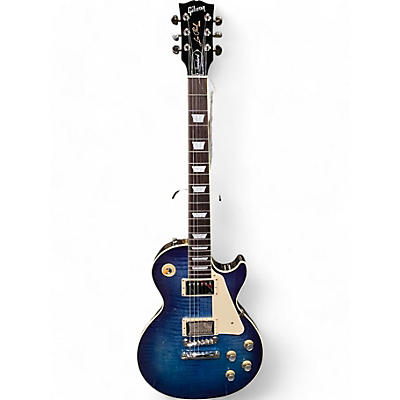About Les Paul Guitars
The Les Paul is one of the most popular solid body electric guitars ever built. There are dozens of models from Epiphone and Gibson that bear the Les Paul name. There are countless other solid body, single-cutaway guitars inspired by it. Still, there's magic in the history of Les Paul guitars you can't get anywhere else.
Epiphone Les Paul guitarsare the most affordable Les Pauls made today. They range from the Epiphone Les Paul Special to artist signature models. You'll also find Epiphone Les Paul starter packs. These all-in-one kits often include an amplifier, strap, cable and picks.
At the upper end of the Les Paul spectrum lie Gibson Les Paul guitars. Made in the Unites States, these models range from the Les Paul Special to the Les Paul Standard. You'll also find Custom Shop limited run and signature Les Paul models. These are designed for and used by some of the most legendary Les Paul players of all time.
While they're certainly not copies of the original Les Paul design, many other builders have their own take on the solid body, single-cutaway guitar design. The PRS SE 245 and the ESP E-II are among the finest examples, each with its own style. The Mitchell MS400 and ESP LTD EC series offer two outstanding and affordable options.
The man behind the guitar, Les Paul, was born Lester Polsfuss in Waukesha, Wisconsin in 1915. He began learning the harmonica at age 8. At age 13, he was earning money as a country singer and guitar player. He was also a born tinkerer. Les Paul experimented with electronics and amplification to try to get more sound out of his guitar.
By the mid-1930s Les Paul was cutting records and performing on the radio. He successfully branched out into jazz. At first with his own trio. Later on with his wife, Mary Ford. By the early 1950s he had numerous chart-topping records, and a national program on the then-brand-new medium of television. Les Paul also pioneered multi-track recording.
In the 1940s, Les Paul was dissatisfied with the sound of amplified archtop hollow body jazz guitar. He began building solid electric guitar designs. The first one was built using a 4x4, to which he affixed side wings from an Epiphone archtop, and dubbed it The Log. He presented this prototype to Gibson. They declined to manufacture a solid body electric. Then Leo Fender's solid body Telecaster began to gain popularity in the early 1950s.
The first Les Paul guitar was introduced in 1952, and set the template for the model, which was meant to continue the Gibson tradition of finely crafted instruments, with luxurious appointments, to contrast with Fender's assembly-line approach to guitar building. The Les Paul featured a body of solid mahogany and a carved maple cap, for deep, rich tone with plenty of sustain, and a set, or glued-in neck, in contrast to Fender's bolt-on one-piece necks. The guitar also featured dual single-coil P-90's pickups, a trapeze tailpiece, and a striking gold finish.
By 1957, the Les Paul featured revolutionary humbucking pickups, which delivered a deeper, warmer tone without the annoying hum from electrical interference common to single-coils, as well as a stunning sunburst finish. These Les Paul Standards from the 1957-60 model years have since become some of the most valuable vintage guitars in history. The Les Paul name was dropped in the early 1960s, as the easier-to-produce SG model took priority, but demand picked up by the late 1960s as rock and blues players like Eric Clapton and Mike Bloomfield favored the late 50s models for their incredible tone and sustain.
The Les Paul guitar model was reintroduced in 1968, and has been a best-seller ever since. That includes models loaded with three humbuckers, ones with dual P-90 single coils, Bigsby vibrato bridges, 12-string and baritone versions, self-tuning Robot models, double-cutaway versions, stripped-down Studios, Custom models with fancier binding and other details, and entry-level Jr. and Melody Maker models, as well as numerous signature axes from such luminaries as Slash and Zakk Wylde. In short, there's bound to be a Les Paul loaded with anything you could want on your own piece of guitar history.
Les Paul Guitar Models
Les Paul Standard | Les Paul Studio | Les Paul Custom | Les Paul Traditional | Les Paul Tribute | True Historic Les Paul | Standard Historic Les Paul | Limited Edition Les Paul





































































































































